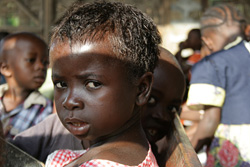
Photo: Nancy Palus/IRIN
|
Educating girls is vital to help eradicate FGM/C says UNICEF (file photo) |
ABIDJAN, 31 May 2010 (IRIN) - Progress on a "Zero Tolerance" national campaign in Côte d'Ivoire to eliminate female genital mutilation or cutting (FGM/C) by the end of 2010, has been slowed down by health and education infrastructure, aid groups said.
Since the campaign began, 180 villages in Marandallah prefecture, in the north-central Worodougou region, no longer practise FGM/C and the aim is to double this by the end of the year.
The Ministry for Family, Women and Social Affairs is at the forefront of the campaign, which is backed by the UN Development Fund for Women (UNIFEM), the UN Children's Fund (UNICEF) and UN Population Fund (UNFPA), according to Ministry head Euphrasie Yao.
FGM/C rates have declined since the civil conflict ended in 2007, but not quickly enough. "FGM is decreasing, but one in three women in this country is still mutilated, and that is too high," Laetitia Bazzi, child protection officer for UNICEF in Côte d'Ivoire, told IRIN.
In 1998 some 49 percent of women and girls aged 10 to 45 were subjected to FGM/C, but by 2006 the number had dropped to around 36 percent.
Deteriorating health and education services fuel persistently high rates, said Bazzi. Schools were the best places to make girls aware of the dangers of FGM/C, and medical personnel were in the best position to tell them about the health dangers of the practice, but both sectors were facing severe staff shortages and inadequate resources.
According to government statistics, FGM/C is most prevalent in the north and west of the country, controlled by Forces Nouvelles, where health and education services have deteriorated most quickly since the conflict, due to lack of resources and the flight of skilled staff to the economic capital, Abidjan.
In the mainly Islamic north, almost 90 percent of women undergo the procedure, and once girls have passed this initiation they are seen as being ready to prepare for marriage and are usually not expected to return to school.
In the village of Tieni in western Côte d'Ivoire, Chief Maho Gamni still allows FGM/C. "It is difficult for the girls to find husbands unless they have the operation - it's our custom." He had not heard of Operation Zero Tolerance, but he told IRIN that "People in Abidjan want to outlaw our customs".
FGM/C poses numerous physical and mental health risks, including birth complications, maternal death, infertility, urinary incontinence and tetanus.
Practitioners of FGM/C can be imprisoned in terms of a law enacted in 1998, but the 17 other African states that have banned FGM/C - including Burkina Faso, Togo and Senegal - have found that they are rarely brought to book.
Chris Baryomunsi, a member of parliament from Kanungu in western Uganda, where the practice was banned in late 2009, told IRIN that a ban must go hand-in-hand with awareness-raising at every opportunity, including in schools, at health clinics, on the radio and through community structures.
Punishment without education would not work, Bazzi told IRIN. "If practitioners are just punished, then the practice is likely to become more clandestine, which would actually endanger the lives of women and girls." |


